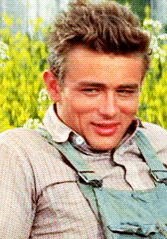--
First I'll throw in my two cents on an issue I wish I didn't have to comment on. Almost everyone knows that East of Eden is based on the novel by John Steinbeck. Although I'm more of a fan of fantastic and surreal literature, Steinbeck and Hemingway are probably my two favorite realist authors. East of Eden is an epic masterpiece, well worth reading. It's also close to 200,000 words long, so obviously, some details and plot points are going to be left out or changed in a two-hour movie, and that shouldn't make a difference. The film is a separate artwork in a completely different medium that should be judged on its own merits, not compared to the book. (For more on this, see my "novel to film mini-rant" in my user profile.)
Director Elia Kazan's East of Eden presents itself as a disarmingly simple film. Many might feel that it's slow or uneventful. But the superficial appearance is intentionally misleading, a filmic representation of the elegant austerity of Steinbeck's literary style; the plot, subtexts and filmic artistry are all really quite complex, and this is the rare example of a film that grows on you more and more after you've seen it.
The plot is a rough "modern" (circa the 1910s) retelling of the biblical tale of Cain and Abel, set in and between Salinas and Monterey, California, as an allegory of good versus evil. But both Steinbeck and screenwriter Paul Osborn weave a dense allegorical tapestry, with those polar ethical opposites becoming less clear-cut as the film progresses.
Cain is Cal Trask (James Dean) here, Abel his brother Aron (Richard Davalos). Their father, Adam (Raymond Massey), owns a "ranch" upon which he grows lettuce. He sees the attainment of excessive profit as negative, and instead focuses his intelligence and skills on trying to better mankind somehow, the practical upshot of which is that Adam is trying to conquer the problem of the preservation of (transported, especially) food via refrigeration or freezing. Adam is sternly frugal and religious, and favors Aron. Thus Cal is something of a hoodlum when the film begins. He's irreverent and tends to wander off. We see him being belligerent and somewhat (self) destructive. Aron, in contrast, seems decorous and easy-going, as does his girlfriend Abra (Julie Harris). In other words, Cal and Aron are basically presented as Goofus and Gallant at the start of the film.
Cal and Aron were told by Adam that their mother was dead. But Cal has suspicions about this, and the first part of East of Eden is concerned with Cal's attempt to discover the truth about his mother. He learns the truth, and the second half covers a number of parallel, somewhat unexpected transformations in the Trask family and their close friends. This is also paralleled with the burgeoning of World War I, which has a complex impact on these (then) small California towns.
The first thing that you're likely to notice with the recent Warner Home Video DVD of East of Eden, after the novelty of the 3-minute "Overture" (which doesn't add much at home, but is interesting historically and doesn't negatively affect anything), is the beautiful cinematography. This was one of the earlier "Cinemascope" (anamorphic 35mm widescreen, with up to a 2.66:1 aspect ratio) films, shot also with a new "Warner Color" process. The results, employing gorgeous California landscapes artfully shot by cinematographer Ted D. McCord under Kazan's direction, are breathtaking. Everything looks scrumptious--from old downtown streets to the rocky ocean shores, distant mountains over sprawling fields, romantically shot freight trains--even the sugar factory standing in for Adam's "barn" and the Monterey whorehouse are beautifully photographed. One of the more famous scenes features Cal and Abra in a dense, colorful, flower-filled field. The Warner Color manages to look both intense and subdued at the same time, which fits the atmosphere of the film perfectly. Kazan employs a lot of subtle camera motions and angles to emphasize the drama, including marvelously skewed angles during confrontations between Cal and Adam.
The score, by Leonard Rosenman, is also worth mentioning, as the mood of the film hinges on it so much. It's lush and sophisticated, with a slight Aaron Copland flavor to my ears. This was Rosenman's first scoring gig. He had been James Dean's piano teacher and had actually studied with famed 12-tone ("serial") music proponent Arnold Schoenberg. Ironically, he felt himself an odd choice and initially suggested that Kazan ask Copland to score the film instead. That probably led to some of the Coplandish tonalities, although to many ears, Rosenman tends to sound more like Alban Berg, another, more famous, Schoenberg protégé.
Of course as a realist drama, the performances in the film are crucial. Dean is outstanding, as one would expect, but so is Harris and the rest of the cast. Part of this must be due to Kazan, as Harris, for example, doesn't come across nearly as well to me in some of her other films, such as Robert Wise's The Haunting (1963).
If East of Eden has a flaw, it's that its relatively short (compared to the material available) running time makes for some unexplained or shallow turnabouts of character in the complex of good/evil interplay. Aron seems particularly distant to the viewer, for example, which is appropriate to the final state of his character, but which could have been explained better in transformation.
But this is a fabulous film, with grand, biblical and universal subtexts and an unusually developed but extremely charming romance. Unless you're completely averse to realist drama, you must see East of Eden at least once.

































































No comments:
Post a Comment